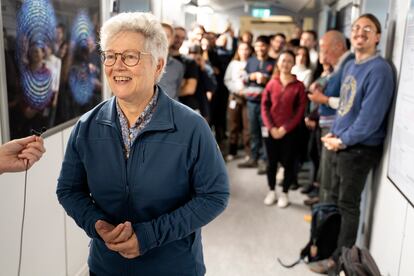Women of science
The two scientists awarded the Nobel Prize are Katalin Karikó, for Covid vaccines, and Anne L’Huillier, for a sharp look into the interior of the atom. Something is moving in Stockholm

The Nobel Prize winners in science that were recently announced include two women. If that seems trivial to you, it’s because you don’t know the history of the 20th century, but let’s take this one step at a time. The two honored scientists are Katalin Karikó, for the Covid vaccines that have saved millions of lives, and Anne L’Huillier, for an acute look into the interior of the atom whose applications we cannot even imagine. It is true that the statistics are depressing. Karikó is only the 13th woman to receive the Nobel Prize in Medicine since the award was founded in 1901, and L’Huillier is only the fifth to win the Nobel Prize in Physics. But it is also true that the trend is on the right track, because most of these researchers have been honored in recent years. Something is moving in Stockholm.
Accusing the Swedish Academy of sexism is difficult. The Nobel committee that awards the prizes collects the opinion of the international scientific elite, and relies heavily on the advice of previous laureates. These elites have been made up of men for a century or so. And you thought the Spanish Football Federation was bad? At the beginning of the 20th century, girls couldn’t even enroll in physics at Harvard University. One of those women was Henrietta Swan Leavitt, the discoverer of the cosmic measuring tape that allowed Edwin Hubble to observe that the universe was expanding. Leavitt should have received the Nobel Prize, but she had died by the time Stockholm became interested in her. At least we could have dedicated a space telescope to her, like we did with Hubble, don’t you think?
There are feminist sectors that complain that in Oppenheimer, Christopher Nolan’s brilliant film about the origins of the atomic bomb, there is no trace of Lisa Meitner, the scientist who developed the theory of nuclear fission and, in broad lines, triggered the Manhattan Project directed by Robert Oppenheimer. I agree with that feminist criticism. Okay, the film is not a history of atomic physics, but a biography of Oppenheimer and his inner demons, yet Einstein, Bohr, Planck and many more show up. Why not Meitner, who was another among those giants?
The reason is probably that Meitner was ignored by history. A Jewish woman living in Germany between wars, what more do you want to get ignored? The Nobel Prize for uranium fission was given to Otto Hahn, with whom she had collaborated closely. In a display of hypocrisy upon receiving the award, Hahn referred to Meitner as an assistant. A remarkably helpful one, because it was she who developed the essential theory. Marissa Moss published The Woman who Split the Atom last year, which may help repair the mess.
First as a molecular biologist and then as a journalist, I have spent half my life fascinated by the genius of two 20th-century scientists who changed my field from top to bottom, Barbara McClintock and Lynn Margulis. Both had to face powerful forces of inertia. The first won the Nobel Prize when she was already old. This is not the time to get demoralized. Girls interested in science now have a brighter future than they did in the last century.
Sign up for our weekly newsletter to get more English-language news coverage from EL PAÍS USA Edition
Tu suscripción se está usando en otro dispositivo
¿Quieres añadir otro usuario a tu suscripción?
Si continúas leyendo en este dispositivo, no se podrá leer en el otro.
FlechaTu suscripción se está usando en otro dispositivo y solo puedes acceder a EL PAÍS desde un dispositivo a la vez.
Si quieres compartir tu cuenta, cambia tu suscripción a la modalidad Premium, así podrás añadir otro usuario. Cada uno accederá con su propia cuenta de email, lo que os permitirá personalizar vuestra experiencia en EL PAÍS.
¿Tienes una suscripción de empresa? Accede aquí para contratar más cuentas.
En el caso de no saber quién está usando tu cuenta, te recomendamos cambiar tu contraseña aquí.
Si decides continuar compartiendo tu cuenta, este mensaje se mostrará en tu dispositivo y en el de la otra persona que está usando tu cuenta de forma indefinida, afectando a tu experiencia de lectura. Puedes consultar aquí los términos y condiciones de la suscripción digital.









































